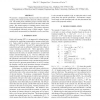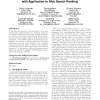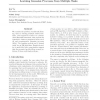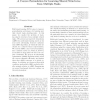232
click to vote
Publication
We generalise the problem of inverse reinforcement learning to multiple tasks, from multiple demonstrations. Each one may represent one expert trying to solve a different task, or ...
119
click to vote
ICASSP
2011
IEEE
14 years 5 months ago
2011
IEEE
We present a nonparametric Bayesian model for multi-task learning, with a focus on feature selection in binary classification. The model jointly identifies groups of similar tas...
113
click to vote
IJON
2010
15 years 16 days ago
2010
We present an EM-algorithm for the problem of learning preferences with Gaussian processes in the context of multi-task learning. We validate our approach on an audiological data ...
112
click to vote
SDM
2007
SIAM
15 years 3 months ago
2007
SIAM
We study the joint feature selection problem when learning multiple related classification or regression tasks. By imposing an automatic relevance determination prior on the hypo...
140
click to vote
NIPS
2007
15 years 3 months ago
2007
When we have several related tasks, solving them simultaneously is shown to be more effective than solving them individually. This approach is called multi-task learning (MTL) and...
115
click to vote
NIPS
2008
15 years 3 months ago
2008
In multi-task learning several related tasks are considered simultaneously, with the hope that by an appropriate sharing of information across tasks, each task may benefit from th...
136
click to vote
KDD
2010
ACM
15 years 6 months ago
2010
ACM
In this paper we propose a novel algorithm for multi-task learning with boosted decision trees. We learn several different learning tasks with a joint model, explicitly addressing...
137
click to vote
ICML
2000
IEEE
15 years 6 months ago
2000
IEEE
Cognitive modeling with neural networks unrealistically ignores the role of knowledge in learning by starting from random weights. It is likely that effective use of knowledge by ...
128
click to vote
ICML
2005
IEEE
16 years 2 months ago
2005
IEEE
We consider the problem of multi-task learning, that is, learning multiple related functions. Our approach is based on a hierarchical Bayesian framework, that exploits the equival...
126
click to vote
ICML
2009
IEEE
16 years 2 months ago
2009
IEEE
Multi-task learning (MTL) aims to improve generalization performance by learning multiple related tasks simultaneously. In this paper, we consider the problem of learning shared s...




